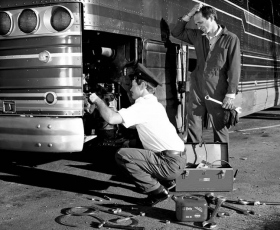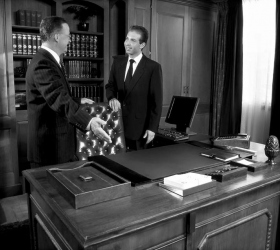Here are the
The Condition of Non-Existence
(New Post Formula)
Every new appointee to a post begins in Non-Existence, whether obtained by new appointment, promotion or demotion.
He is normally under the delusion that now he is “THE ________” (new title). He tries to start off in Power Condition as he is usually very aware of his new status or even a former status. But in actual fact he is the only one aware of it. All others, except perhaps the Personnel Officer, are utterly unaware of him as having his new status.
Therefore he begins in a state of Non-Existence. And if he does not begin with the Non-Existence Formula as his guide, he will be using the wrong condition and will have all kinds of trouble.
Non-Existence Formula
The Non-Existence Formula is:
1. Find a
2. Make yourself known.
3. Discover what is needed or wanted.
4. Do, produce and/or present it.
A new appointee taking over a
Sometimes he assumes he knows what is needed or wanted when it is only a fixed idea with him and is only his idea and not true at all and so he fails at his job.
Sometimes he doesn’t bother to find out what is really needed or wanted and simply assumes it or thinks he knows when he doesn’t. He soon becomes “unsuccessful.”
Now and then a new appointee is so “status
Sometimes he finds that what he is told is needed or wanted needs reappraisal or further investigation. So it is always safest for him to make his own survey of it and operate on it when he gets his own firm reality on what is needed or wanted.
If the formula is applied intelligently the person can expect to get into a zone of bypass where people are still doing his job to fill the hole his predecessor may have left. This is a Danger Condition—but it is the next one higher than Non-Existence on the scale. If he defends his job and does his job and applies the Danger Formula, he will come through it.
He can then expect to find himself in Emergency Condition. In this, he must follow the Emergency Formula with his post and he will come through it.
He can now expect to be in Normal Operation and if he follows the formula of that, he will come to Affluence. And if he follows that formula, he will arrive at Power. And if he applies the Power Formula, he will stay there.
So it is a long way from Power that one starts his new appointment and if he doesn’t go up the scale from where he really is at the start, he will of course fail.
This applies to groups, to organizations, to countries as well as individuals.
It also applies when a person fails at his job. He has to start again at Non-Existence and he will build up the same way condition by condition.
Most failures on post are occasioned by failures to follow the conditions and recognize them and apply the formula of the condition one is in when one is in it and cease to apply it when one is out of it and in another.
This is the secret of holding a post and being successful on a job or in life.
Non-Existence Formula Expanded
Many people misapply the Non-Existence Formula and then wonder why they seem to continue in trouble.
Executives sometimes wonder why certain staff personnel never seem to be able to do anything right and out of exasperation wind up handling the whole area themselves.
The answer is a misapplication of and not really doing the Non-Existence Formula on post.
Experience has shown that even experienced executives and staff members have not in fact ever come out of Non-Existence. And where the organization runs at all, it is carried on the back of one or two key seniors.
The phrase “find a communication line” is shortened down by too many to locating somebody’s in-basket and dropping a “needed and wanted” request in it. This is not really finding a communication line.
To handle any post, you have to have information and furnish information. Where this is not done, the person finds himself doing projects that get rejected, projects that have to be redone, restraints put on his actions and finds himself sinking down the conditions. He gets
It is the duty of any staff member, new on post or not, to round up the communication lines that relate to his post, find out who needs vital information from him and get those lines in in in as a continuing action.
When a person fails to do just that, he never comes out of Non-Existence. He isn’t even up to Danger because nobody knows they are even bypassing him. In other words, when a staff member does not do that, in the eyes of the organization, he is simply a zero.
Orders being issued by him usually wind up cancelled when discovered by some senior because they are not real. Joe was already handling it. Bill’s schedule was thrown out by it. Treasury yells, “How come this wasted expense?”
Pretty soon, when staff hears it’s so-and-so’s order they just ignore it.
The bright hopes of such a person usually wind up as hopes he will be able to get transferred, the sooner the better. Everybody is against him.
But what really happened?
He never applied the Non-Existence Formula for real and so he stayed in Non-Existence. His actions do not coordinate because he does not have the lines to give or receive information.
It is really and factually not up to anyone else to round up his lines for him any more than it is up to others to do his breathing for him. The inhale and exhale of an organization is the take and give of vital information and particles.
Anyone who finds himself in apparent Non-Existence or worse, should rush around and find the communication lines that apply to his activity and post and insist that he be put on those lines.
Such a person, staff member or executive has to write down what information he has to have to handle his post and what information others have to have from him to do their jobs.
And then arrange communication lines so that he is an info addressee from secretaries on those lines.
Senior executives such as division heads or heads of an organization do have a responsibility for briefing staff. But they are usually also faced with security problems as well as a wish to look good. And their data is general for the whole division or organization. It does include specifics like “Mrs. Zikes is arriving at 1400 hours” or “The telephone company rep says the bill must be paid by 1200 hours today or we got no phones.”
Havoc and overwork for executives occur where the bulk of the staff has omitted to get themselves on important communication lines and keep those lines flowing. Do not send to find why the statistics are down if 90 percent of your staff is in Non-Existence or worse! Simply because they never really found any communication lines.
Therefore the Expanded Non-Existence Formula is:
1. Find and get yourself on every communication line you will need in order to give and obtain information relating to your duties and
2. Make yourself known, along with your post title and duties, to every person you will need for the obtaining of information and the giving of data.
3. Discover from your seniors and fellow staff members and any public your duties may require you to contact, what is needed and wanted from each.
4. Do, produce and present what each needs and wants that is in conformation with policy.
5. Maintain your communication lines that you have and expand them to obtain other information you now find you need on a routine basis.
6. Maintain your origination lines to inform others what you are doing exactly, but only those who actually need the information.
7. Streamline what you are doing, producing and presenting so that it is more closely what is really needed and wanted.
8. With full information being given and received concerning your products, do, produce and present a greatly improved product routinely on your post.
I can guarantee that if you do this—and write your information concisely so it is quick to grasp and get your data in a form that doesn’t jam your own lines—you will start on up the conditions for actual and in due course arrive in Power.
The Condition of Danger
A Danger Condition is normally assigned when:
1. An Emergency Condition has continued too long.
2. A statistic plunges downward very steeply.
3. A senior executive suddenly finds himself or herself wearing the hat of the head of the activity because it is in trouble.
To bypass someone means to jump the proper terminal (person or post) in a chain of command.
If you declare a Danger Condition, you of course must do the work necessary to handle the situation that is dangerous.
This is also true backwards. If you start doing the work of another on a bypass you will of course
Further, if you habitually do the work of others on a bypass, you will of course inherit all the work. This is the answer to the overworked executive. He or she bypasses. It’s as simple as that. If an executive habitually bypasses, he or she will then become overworked.
Also the condition of Non-Existence will occur.
So the more an executive bypasses, the harder he works. The harder he works on a bypass, the more the section he is working on will disappear.
So purposely or unwittingly working on a bypass, the result is always the same—Danger Condition.
If you have to do the work on a bypass, you must get the condition declared and follow the formula.
If you declare the condition, you must also do the work.
You must get the work being competently done, by new appointment or transfer or training of personnel. The condition is over when that portion of the company or organization has visibly, statistically recovered.
So there are great responsibilities in declaring a Danger Condition. These are outweighed in burdensomeness by the fact that if you don’t declare one on functions handled by those under you which go bad, it will very soon catch up with you yourself,
a Danger condition exists.
There’s the frying pan—there’s the fire. The cheerful note about it is that if the formula is applied, you have a good chance of not only rising again but also of being bigger and better than ever.
And that’s the first time that ever happened to an executive who started down the long slide. There’s hope!
When the formula for handling a Danger Condition is not done, an organization or activity or person cannot easily get above that condition thereafter.
A prolonged State of Emergency or threats to viability or survival or a prolonged single-handing will not improve unless the actual Danger Formula is applied.
Danger Formula
The formula follows:
1. Bypass (ignore the junior or juniors normally in charge of the activity and handle it personally).
2. Handle the situation and any danger in it.
3. Assign the area where it had to be handled a Danger Condition.
4. Assign each individual connected with the Danger Condition a Personal Danger Condition and enforce and ensure that they follow the formula completely. And if they do not do so, do a full Ethics Investigation and take all actions indicated.
5. Reorganize the activity so that the situation does not repeat.
6. Recommend any firm policy that will hereafter detect and/or prevent the condition from recurring.
The senior executive present acts and acts according to the formula above.
Personal Danger Formula
The formula is converted for personal application to:
1. Bypass habits or normal routines.
2. Handle the situation and any danger in it.
3. Assign self a Danger Condition.
4. Get in your own personal ethics by finding what you are doing that is out-ethics and use self-discipline to correct it and get honest and straight.
5. Reorganize your life so that the dangerous situation is not continually happening to you.
6. Formulate and adopt firm policy that will hereafter detect and prevent the same situation from continuing to occur.
Here is an example of how the Personal Danger Formula could be applied.
The step “bypass habits or normal routines” means bypass doing all this stuff you’ve been doing.
Let us say a fellow was accepting money from his uncle and saying he was buying a house with it and he wasn’t. He was spending it on a blonde. Now he is in continuous danger. His uncle might find it out at any moment and he expects to inherit his uncle’s fortune someday. So he’s in a sort of
Now, “handle the situation and any danger in it” could be spotted as the basic reason. Because he has done things he is not telling and he is connected in some way and it’s pretty weird and he’s liable to be tripped. Well, all right, he’d have to quit doing that—bypass the habits or normal routines of the thing. In other words, quit accepting that money.
But he’d also have to handle the situation and any danger in it. It would be very dangerous to write, “Dear Uncle George: For the last year and a half, all the money you’ve been sending me to buy a house with, I have been spending on a blonde named Floozie.” Well, he’d have to figure out how to handle that so that there wasn’t any danger in it. And it might take quite a bit of thinking.
If he just jumped up and said to his uncle, “Well, I’ve been lying to you, Uncle George. I’ve been wasting all of your dough,” the possibility is that this would come as such a shock to Uncle George that he’d disinherit him, shoot him and so forth. He would really be in danger. So he’d have to figure out how to handle it. It might be as simple as, “Dear Uncle George: I have been getting processed lately with Scientology, and it’s making a more honest man out of me. And there are many dishonest things which I have done in my life and one of them is this. Now, you will probably shoot me for having done this, and it is not fair to you but actually I have been using this money to live off of and…”
Then “assign self a Danger Condition” is only there because people forget to assign it. And then you “get in your own personal ethics by finding what you are doing that is out-ethics and use self-discipline to correct it and get honest and straight.” Now there might be some other “Uncle Georges” (and we’ve still got to handle this blonde named Floozie). Even though one might have handled the uncle there might be some more.
Then “reorganize your life so that the dangerous situation is not continually happening to you”—well, that’s easy, in this
And then, “formulate and adopt firm policy that will hereafter detect and prevent the same situation from continuing to occur.” In other words, “I’m not going to tell lies so that I can get money,” or something like that, is all the guy would have to decide. It’s like a New Year’s resolution. But people don’t keep them because they didn’t get in the first five steps. That’s why New Year’s resolutions aren’t kept. You are actually asking the guy at this point to reform.
Junior Danger Formula
Where a Danger Condition is assigned to a junior, request that he or she or the entire activity write up his or her overts and withholds and any known out-ethics situation and turn them in at a certain stated time on a basis that the penalty for them will be lessened but if discovered later after the deadline it will be doubled.
A harmful act or a
An unspoken, unannounced transgression against a moral code by which the person is bound is called a “withhold.” A withhold is an overt act that a person committed that he or she is not talking about. It is something that a person believes that if revealed will endanger his self-preservation. Any
The full procedure for writing up one’s overts and withholds is given in the “Integrity and Honesty” course.
This write-up done, require that the junior and the staff that had to be bypassed and whose work had to be done for them or continually corrected, each one write up and fully execute the Personal Danger Formula for himself personally and turn it in.
When production has again increased, the Danger Condition should be formally ended and an Emergency Condition assigned and its formula should be followed.
The Condition of Emergency
It is an empirical (observed and proven by observation) fact that nothing remains exactly the same forever. This condition is foreign to this universe. Things grow or they lessen. They cannot apparently maintain the same equilibrium (balance) or stability.
Thus things either expand or they contract. They do not remain level in this universe. Further, when something seeks to remain level and unchanged, it contracts.
Thus we have three actions and only three. First is expansion, second is the effort to remain level or unchanged and third is contraction or lessening.
As nothing in this universe can remain exactly the same, then the second action (level) above will become the third action (lessen) if undisturbed or not acted on by an outside force. Thus actions two and three above (level and lessen) are similar in potential and both will lessen.
This leaves expansion as the only positive action which tends to guarantee survival.
To survive, then, one must expand as the only safe condition of operation.
If one remains level, one tends to contract. If one contracts, one’s chances of survival diminish.
Therefore there is only one chance left and that, for an organization or an individual, is expansion.
In order to expand in such a situation, one needs to apply the formula for a condition of Emergency.
One applies the Condition of Emergency when:
1. Statistics of an organization, department or portion of an organization or a person are seen to be declining.
2. Unchanging statistics of an organization or a portion of an organization or a person.
The formula for the condition of Emergency is:
1. Promote. That applies to an organization. To an individual you had better say “produce.” That’s the first action regardless of any other action, regardless of anything else, that is the first thing they have to put their attention on.
Exactly what is promotion? Well, look it up in the dictionary. It is making things known. It is getting things out. It is getting oneself known, getting one’s products out.
2. Change your operating basis. If, for instance, you went into a Condition of Emergency and then you didn’t change your operation after you had promoted, you will just head for another Condition of Emergency. So that has to be part of it. You had better change your operating basis because that operating basis led you into an Emergency.
3. Economize.
4. Prepare to deliver.
5. Stiffen discipline. Part of the Condition of Emergency contains this little line of “you have got to stiffen discipline” or “you have got to stiffen ethics.”
To an individual, this would simply mean not go down to the pub every Friday night. Stiffen up the discipline. Stay home and burn the midnight oil, do one’s homework, etc. Be a little more regular on the job, work a little harder, don’t goof quite so much, don’t make so many mistakes. All of this would be part of stiffening discipline.
Organizationally, suppose the activity doesn’t come out of emergency when a State of Emergency is assigned. Regardless of what caused the emergency, in spite of the fact that they have been labeled a State of Emergency, suppose the activity just doesn’t come out of emergency. They have been directed to “follow the formula,” they have been told to “snap and pop” and “get that thing straightened out,” yet they are still found to be goofing and the statistic continues to go down. What do you do? There is only one thing left to do and that is discipline. Because life itself is going to discipline the individual.
So the rule of the game is if a State of Emergency is ignored and the steps are not taken successfully (“not taken successfully” is different than “not taken”), then you get an announcement that the condition has been continued. And if the condition is continued beyond a specified period of time, it has to walk forward into an ethics matter. Because how else could you straighten out that activity? There must be somebody goofing like crazy, sitting on most of the communication lines. You’ve got some ethical problem involved with it, somebody who won’t function, somebody who has got the brakes on so that you can smell the smoke. And so you walk forward into an ethical situation.
The Condition of Normal
You could call Normal a “condition of stability” and it probably should be called a condition of stability, except for this one little factor: This universe does not admit of a static state. It won’t admit a no-increase, no-decrease. You cannot have a condition in this universe where there is no increase and no decrease. That’s a totally stable condition and there is no such thing in this universe, from one end of it to the other. There isn’t anything that always remains the same.
The Condition of Normal Operation, then, is not one of “stability,” because it can’t be. Normal Operation must be a routine or gradual increase. And there must be a regular, routine, gradual increase. And if there is no gradual increase, there will not be a condition of stability. You cannot have a total, even state of existence which does not eventually fall on its head. The second you get this even state in this universe, it starts to deteriorate. So a state of stability would eventually deteriorate. To prevent a deterioration, you must have an increase. That increase doesn’t have to be spectacular, but it has to be something. There has to be a bit of an increase there.
Normal Formula:
1. Don’t change anything. The way you maintain an increase is when you are in a state of Normal Operation, you don’t change anything.
2. Ethics are very mild. The justice factor is quite mild and quite reasonable. There are no savage actions taken particularly.
3. Every time a statistic betters, look it over carefully and find out what bettered it. And then do that without abandoning what you were doing before. Those are the only changes you make.
4. Every time a statistic worsens slightly, quickly find out why and remedy it.
And you just
The Condition of Affluence
When you have a line going steeply up on a graph, that’s Affluence. Whether it’s up steeply for one week or up steeply from its last point week after week after week, it’s Affluence.
When you’ve got an Affluence, regardless of how you did it, the Affluence Formula applies.
You must apply the Affluence Formula or you will be in trouble. Anyone dealing with Affluence should be aware of the following peculiarities about it.
Affluence is the most touchy condition there is. Misname it or handle it off formula and it can kill you! It is, strangely enough, the most dangerous of all conditions in that if you don’t spot it and apply the formula, you spatter all over the street! Spot and handle it right and it’s a rocket ride.
The Affluence Formula is:
1. Economize. Now the first thing you must do in Affluence is economize and then make very, very sure that you don’t buy anything that has any future commitment to it. Don’t buy anything with any future commitments, don’t hire anybody with any future commitments—nothing. That is all part of that economy. Clamp it down.
2. Pay every bill. Get every bill that you can possibly scrape up from anyplace, every penny you owe anywhere
3. Invest the remainder in service facilities. Make it more possible to deliver.
4. Discover what caused the Condition of Affluence and strengthen it.
Action Affluence Formula:
When an Affluence exists based on a statistic measuring one’s actions, and disrelated to finance, this is the formula to apply.
1. Economize on needless or dispersed actions that did not contribute to the present condition. Economize financially by knocking off all waste.
2. Make every action count and don’t engage in any useless actions. Every new action to contribute and be of the same kind as did contribute.
3. Consolidate all gains. Any place we have gotten a gain, we keep it. Don’t let things relax or go downhill or
4. Discover for yourself what caused the Condition of Affluence in your immediate area and strengthen it.
The Condition of Power
A Power stat is a stat in a very high range; a brand-new range in a Normal trend.
A Power stat is not just a stat that is steeply up for a long time. Nor is Power simply a very high stat. Power is not a one-week thing. Power is a trend.
Definition: Power is a Normal in a stellar range so high that it is total abundance, no doubt about it. It is a stat that has gone up into a whole new, steeply high range and maintained that range and now, in that new high range, is on a Normal trend.
Operating in this new range, you may get a slight dip in that stat now and then. But it is still Power.
There is another datum that is of importance if one is to correctly recognize and understand this condition:
Why do we call it Power?
Because there is such an abundance of production there that momentary halts or dips can’t pull it down or imperil its survival.
And that is Power.
The question could be asked, “How much work can one guy do?” Or, “How many bricks can a guy lay in a day?”
Of course, a person can only work so many hours in a day. He can only get so much individual production in a day. But he can get enough production in a day to support himself. He can get his production up into such abundance that he can take some time off. That depends on his efficiency and brightness.
At a certain peak of Affluence, he will hit how many bricks he can lay. By increasing practice and efficiency, he can keep that level of production going in a Normal.
If he’s laying so many bricks that nobody is ever going to think of firing him, why, he’s in Power. That’s a Power Condition for an individual.
a condition of Power exists.
1. Don’t disconnect. The first law of a Condition of Power is don’t disconnect. That will bring about catastrophe for both you and anybody else.
You’ll find out that people whine and complain about this. How about the big boy? He’s been a local boy in some town and all of a sudden he becomes a big boy. He’s highly powerful on Wall Street and he never again speaks to any of his friends in the old home town. Those people resent that so much that it’s almost impossible to speak to them. That is to say, if you’ve been in an area where you’ve been very well known and you suddenly become a celebrity or something like that, these people won’t believe that you want to talk to them, you see? They’re so used to having the formula violated. You get the idea? In other words, beings in the universe fully expect that you’re going to violate the first position of the Power Condition, which is “don’t disconnect.” They think you’re going to disconnect.
No! Power! Position of Power! Don’t disconnect. Even though you’re promoted to general from colonel of a regiment, don’t be such a fool as to think that you can totally disconnect from that regiment. Because the only way you can’t disconnect from the regiment is to disconnect from it. You can’t just deny your connections. What you’ve got to do is take ownership and responsibility for your connections.
2. Write up your own post.
Now, the Condition of Power is the guy going into a Condition of Power or the organization going into a Condition of Power. And the Condition of Power Change is actually a fellow assuming a condition which has been held from Power. You get the difference? You’re replacing Bill, who was in a Condition of Power. Now, when he moves off, disconnects, then the Power Change is who took over. The first thing an upgrade of the Power has got to do is make a record of all the post’s lines. That’s the only way he will ever be able to disconnect. And then the assumption of this state of Power, Power Change, is governed by its own formula.
Now, for instance, I’ll show you how this applies big and small. Supposing you were a very, very successful Receptionist in an organization and you were so successful that you were made the Registrar. Well, actually, that is an upgrade of Power. Now, you don’t permit the person who takes over the post to operate in a condition of Power Change unless you make a total record of your post.
So, on a Condition of Power, the first thing you have to do is write up your whole post. You’ll find out if you don’t write up your whole post, you’re going to be stuck with a piece of that post for time
It’s no sudden disconnection. That’s what it really amounts to. Don’t go disconnecting. And the responsibility is write the post up and get it into the hands of the guy that’s going to take care of it. Now if the other guy doesn’t take care of it, that’s his track, that’s not yours.
Do all you can to make the post occupiable. Sooner or later somebody is going to come along and occupy the post properly.
The Condition of Power Change
There are only two circumstances which require replacement: the very successful one or the very unsuccessful one.
What a song it is to inherit a successful
Power Change: don’t change anything.
You just sit around for a while. You know immediately that all of the pressure points in the organization are going to come to you at once. The fellow who had the position before you had all these pressure points, but he must have resisted them successfully because they still exist. See? So, anybody wants anything signed that your predecessor didn’t sign, don’t sign it. That’s an easy rule to follow, isn’t it? This absolutely is the laziest position that anybody could ever occupy. And that’s the only way it can be occupied—with total laziness. Don’t do anything!
Keep your eyes open,
Go through the exact same routine of every day that your predecessor went through, sign nothing that he wouldn’t sign, don’t change a single order. Look through the papers that have been issued at that period of time—these are the orders that are extant—and get as busy as the devil just enforcing those orders and your operation will increase and increase and increase and increase.
The
One takes over a new post or a collapsed post in Non-Existence. But a going concern is taken over by the Power Change Formula.
The formula of the Power Change Condition is:
When taking over a new post change nothing until you are thoroughly familiar with your new zone of power.
Power Change Violation Repair Formula
A Danger Condition can be brought about by a violation of the Power Change Condition.
Where a person or organization has had a Power Change and violated the formula, they must apply the Power Change
Violation Repair Formula:
1. Observe, question and draw up a list of what was previously successful in your area or zone of control.
2. Observe and draw up a list of all those things that were unsuccessful in your area in the past.
3. Get the successful actions in.
4. Throw the unsuccessful actions out.
5. Knock off frantically trying to cope or defend.
6. Sensibly get back in a working structure.
one of the states of operation or existence which an organization, its parts or an individual passes through. Each condition has an exact sequence of steps, called a formula, which one can use to move from the current condition to another higher and more survival condition.
the route along which a communication travels from one person to another.
an activity that is flourishing and actively operating to full capacity.
great confusion, disorder or chaos; destruction.
obsessed by or quick to use the item indicated (usually used in combination, as in “status happy”).
give (someone) an acknowledgment. See also acknowledgment.
in trouble.
all the things that are used or needed in any business, undertaking or operation (distinguished from personnel).
unknowingly; without awareness.
make nothing of.
whether one chooses it or not; willingly or unwillingly.
resembling or simulating an overpowering fear or anxiety, but not really being the same as that condition.
based on an idea that is possible and imagined rather than real or true.
acts which violate laws or moral codes.
a harmful act or a transgression against the moral code of a group. An overt act is not just injuring someone or something, it is an act of omission or commission which does the least good for the least number of people or areas of life, or the most harm to the greatest number of people or areas of life.
an unspoken, unannounced transgression against a moral code by which a person is bound; an overt act that a person committed that he or she is not talking about. Any withhold comes after an overt act.
to direct or maneuver by cleverness or skill.
a variation of under the sun, meaning “on earth; in the whole world,” used to add emphasis to a statement.
to move (steeply) up and down, rise and fall. From the literal meaning, a steep, sharply curving elevated railway with small open passenger cars that is operated at high speeds as a ride in an amusement park.
extending back beyond memory, record or knowledge.
figuratively, a position or situation. The expression is a variation of the phrase fill (someone’s) shoes, meaning to take the place of (a predecessor); to take over one’s job or position and its duties or responsibilities satisfactorily.
become familiar with the special procedures or techniques involved in something; the customary actions or practices of some area, field, etc.; the ways to get around and do things or get things done. This term derives from the days of sailing ships, wherein a sailor or apprentice had to become thoroughly familiar with handling the ropes that control the sails of a ship.
the central or most important point or theme of something.







